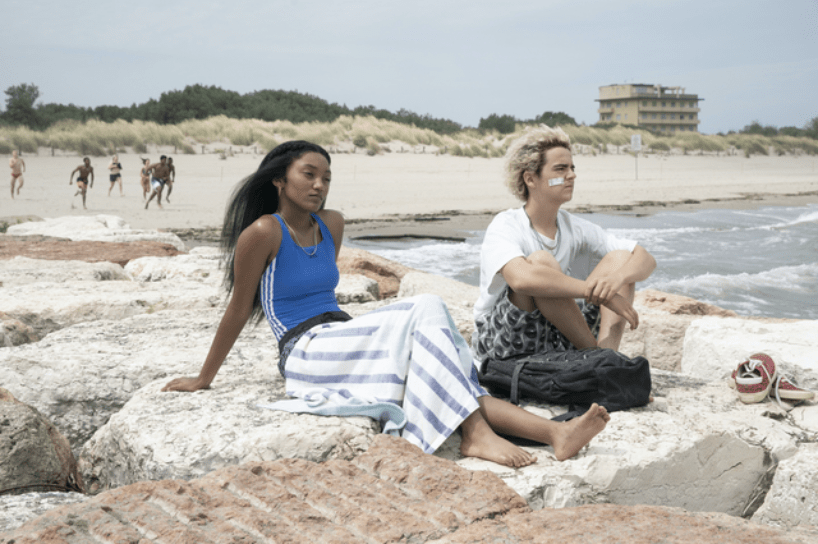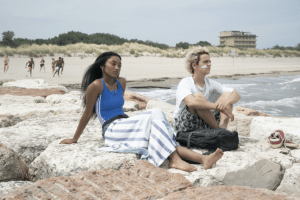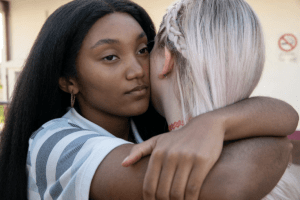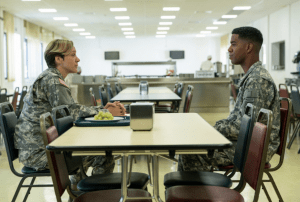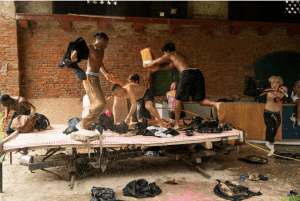Written by William Yeh
There’s no scene that embodies the spirit of Luca Guadagnino’s “We Are Who We Are” as perfectly as in Episode Three, where two high schoolers lay on a bed, scrolling through pictures on a laptop. Caitlin (Jordan Kristine Seamon) ponders her gender identity as she awes over the bodies of transgender men. Besides her lies the new kid on the block: Fraser (Jack Dylan Grazer), who’s making a comparison between the signs of an identity and the symptoms of a fever.
“Transgender means that, you say, you know what? It’s not that simple. It’s not even binary.” Caitlin – who also goes by Harper – may be confused on a multitude of things, but the same raw and aching energy of desires radiating from Fraser burns in equal ferocity underneath Caitlin’s external persona. “It’s like a fever. It is, but it isn’t. It’s like a symptom and if you pay attention, you discover real life. It’s a revolution going on inside of you.”
The same is true for the entirety of “We Are Who We Are”, HBO’s new limited series. Set in 2016, the series revolves around families living on an American military base in the sleepy little town of Chioggia, Italy. Like Fraser’s words, the very essence of the new drama is, from afar, a lush and picturesque painting, comparable to Monet or Renoir. Yet, as the curtains are pulled away and the people and places become overwhelmingly real, the boiling pool of emotions and yearning within our protagonists only becomes all the more unpredictable in its seemingly inevitable discharge.
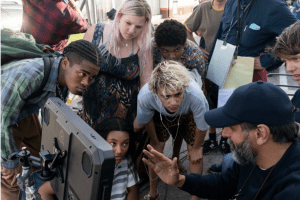
Clockwise from far left: Ben Taylor, Francesca Scorsese,
Spence Moore II, Jack Dylan Grazer, Jordan Kristine Seamón.
Yannis Drakoulidis/HBO
It’s been two years since the Oscar nominated director’s last feature film, Suspiria, and Luca Guadagnino has finally returned with everything you’d hope and expect.
“We Are Who We Are”, in broad strokes, appears as a blood relative to Guadagnino’s universally beloved “Call Me By Your Name”. The similarities may be undeniable – after all, both are coming-of-age dramas set in Italy that concern the life, drama, and romances of sexually-fluid youths – but to attach such simple labels onto the series would be an easy mistake that fails to do justice to its quiet brilliance.
The series opens on Fraser Wilson’s arrival in Italy with his mothers, Sarah Wilson (Chloe Sevigny), the newly assigned Colonel of the army base, and Maggie (Alice Braga), a military physician. Their luggage has been lost en route, and from the very first moments, Fraser’s – and the series’ – erratically rebellious sensibilities.
Unlike his previous cinematic endeavors, Guadagnino this time isn’t peering through the eyes of intellectuals, artists or Bach-infatuated teens, but rather the working-class citizens. Characters are flawed, emotional, uncertain, and Guadagnino neither shys away from it nor indulges in it.
For Fraser, every line, clothing, and action is an act of defiance. It’s not just in his bleached blonde hair, black-and-yellow fingernails, and baggy leopard pants, but also in his sheer intensity at every moment. His awkwardness and put-on attitude towards any authority makes for a character study at a degree of intimacy equal perhaps to that of Elio Pearlman’s. While Jack Dylan Grazer may already be an established actor – having proven himself in 2017’s “It” and last year’s superhero film “Shazam!” – Grazer’s seamless blend into character is perhaps his greatest yet. It’s an astonishingly real encapsulation of youthful individualism that holds at heart both the yearnings and flaws of someone that’s not always easy to like.
In a profile with GQ magazine, Grazer states:
‘I think every single person born as a boy has this guard. It’s this guard that they don’t even realize they have, where they’re initially like, ‘Being gay? I could never.’ But we’re all born as humans who are attracted to whatever we’re attracted to,” he says. “I think that’s how Fraser interprets it as well. Yes, he’s reserved and nervous about it in the beginning because he’s unlocking this new idea for himself. He’s figuring it out, and that’s what you see in the show: him coming to terms with this idea.’”
Sevigny’s Sarah and Braga’s Maggie are of equal complexity. In moments of Fraser’s sudden distraughtness, Sarah will hand him a small vial of vodka or pour him a bottle of wine; his occasional asthma attacks sends him into an emotional interdependency with Sarah, even if the two just had an intense, physical fight hours earlier.
Sarah’s struggles with Fraser is almost contradictory to her status on base. As the new commanding colonel, her name quickly became known throughout the troops, and her openly gay relationship sprouting tension and unease from certain individuals. Work soon diverts much of Sarah’s attention, leaving Maggie alone and unrecognized.
“You’re born to command; I should know,” Maggie says to Sarah – a line that evokes their relationship dynamic. In a world of orderers and the orderees, every moment of their link seems to be a graceful but uncertain dance between the thin line.
While the Wilson family’s dynamics and loose parenthood may appear as overwhelming, even annoying on paper, the characters are thrust onto the screen with such incredible rawness and authenticity that sheds light on every facet of these characters’ multidimensional struggles. From the outset, Caitlin and her family appear almost as polar opposites, yet once again the intrigue lies in the parallels between the households.
This parallel between households isn’t figurative; it’s literal. Right beside the Wilson household lives Caitlin with her conservative father Richard (Scott “Kid Cudi” Mescudi), her mother Jenny (Faith Alabi), and brother Danny (Spence Moore II).
Whereas the entirety of episode 1 (titled “Right Here, Right Now I”) takes place from the perspective of Fraser’s arrival, episode 2 flips the previous hour on its head and reevaluates the same events from Caitlin’s eyes, beginning from different places, but inevitably drawn towards the same ends.
Unlike the new kid on the block, Caitlin has already spent much more time on base. She’s a father’s girl: she spends her early mornings with Richard on boat trips, practices boxing with him at night, and has a connection closer to him than she does with her mom and brother. Outside, she’s in cliques, dates around, and enjoys the beaches. Yet she also sneaks off to spend time alone. In secret, she hides her long hair, passes herself off as a boy and openly flirts with other girls, and only when the platonic friendship between Fraser and Caitlin sprouts does her unseen side emerge.
Newcomer Jordan Kristine Seamón rises to Grazer’s Fraser with incredible ease and naturalism. They may be opposites – one anarchic, awkward and uncertain; the other adjusted, cool-headed and confident – yet it’s the pure honesty that lies between their connection that creates the foundation for the entire series. It’s a celebration of youth and queer identity, through and through, yet the cast never forgets that it’s only through their individual humanity and vulnerabilities can their journeys be fully realized. Their instinctive rejections and deviations from the paths they’ve been given were never played off as reactionary, but rather as an honest reflection of independence and heteronormaty.
If Fraser’s counterpart lies in Sarah, Caitlin’s lies in Richard, an officer of a lower position than Sarah. He’s primarily introduced in the second episode in a sweet moment with Caitlin at early dawn, where the two play-fights in laughter and excitement. Yet it’s hinted early on that his behavior and philosophy is influenced by his political identification until, in an almost Bressonian revelation, quietly erupts in a scene where his ordered MAGA hats arrive. The base doesn’t allow for politics, yet the infiltration of Trump’s view of Americanism nonetheless permeates throughout the episodes. (“[Richard] only wants me to make American food”, says Alabi’s Jenny to Braga’s Maggie, during a talk Jenny’s Nigerian culture and heritage.)
It’s perhaps ironic that it took an Italian director to recognize the distinct profoundness of American identities in American military kids. In a featurette, Guadagnino states,
I think what is important about choosing an American military base is because in a way America is a concept that is built every time by Americans everywhere they are. So, I like this kind of place of exception within the realm of Italy that, in a way, is not an exception to them. That’s their country. That’s their home.”
One of the most striking choices of “We Are Who We Are” is its time period. As contemporary as the series feels, it’s in fact set merely 4 years ago in 2016, during Trump’s initial campaign, which now comes across as especially charged amidst the upcoming election. Likewise, the tension also ratches up within the context of the narrative: an explicit playing of a Trump advertisement calling for a Muslim ban mirrors Caitlin’s brother danny’s own consideration of Islam; similarly, Trump’s military transgender ban later on also comes head to head against Caitlin’s own sexual explorations – a factor that may or may not play into future episodes.
In the opening scene of the third episode, Fraser and Caitlin lie casually on a canoe as Fraser recites a poem – “Threshold”, the opener to Ocean Vuong’s “Night Sky with Exit Wounds”. Intrigued, Caitlin asks why he reads poetry, to which Fraser replies, “every word means something.”
Poetic is perhaps the only way to truly describe the meditative languidness carefully constructed, piece by piece, by Guadagnino. Although a handful of episodes are all titled “Right Here, Right Now”, the idea of a moment in the present is always inexorably tied to the idea of memory and time. It could be literal – like the frames halted in motion as the sound washes pass to the next scene, or in the show’s 2016 setting – or in the very atmosphere of bygone youth.
It’s all perfectly and seamlessly placed together in a blending of lives, binaries and dualisms – straight and gay, Black and White, Western and European, adolescence and adulthood, love and hate. Such is fittingly matched by the soundtrack: the show gleefully hops from John Adams to Kanye and Ryuichi Sakamoto to Neil Young. But it’s also undeniable that Guadagnino is working with a great team able to propel at equal strength and rhythm to his. There’s the breathtaking cinematography of Frederik Wenzel’s, the editing of Marco Costa (who worked on 2018’s “Suspiria” as the 2nd Assistant Editor), and the original music of Devonte Hynes (who also notably composed Gia Coppola’s coming-of-age drama “Palo Alto”). Like the ensemble themselves, the creators behind the team are uninterested in simple labels or two dimensional stylistic elements, allowing for something delightfully unpredictable at every turn.
Guadagnino may not be necessarily concerned about explosive momentums – as evident in both “Call Me By Your Name” and the 152-minute “Suspiria” – but that never was what the series was about. It’s primary concern isn’t that of hooking weekly viewers or hastened bingers; it’s a contemplative immersion of absolutes into the Here and the Now.
It’s careful, affectionate, and as luminous a piece as Guadagnino has ever done.
July and August may already have passed and gone, but the precise encapsulation of Summer’s faint melancholia and the adolescents’ carefree emancipation still rings close and true.
